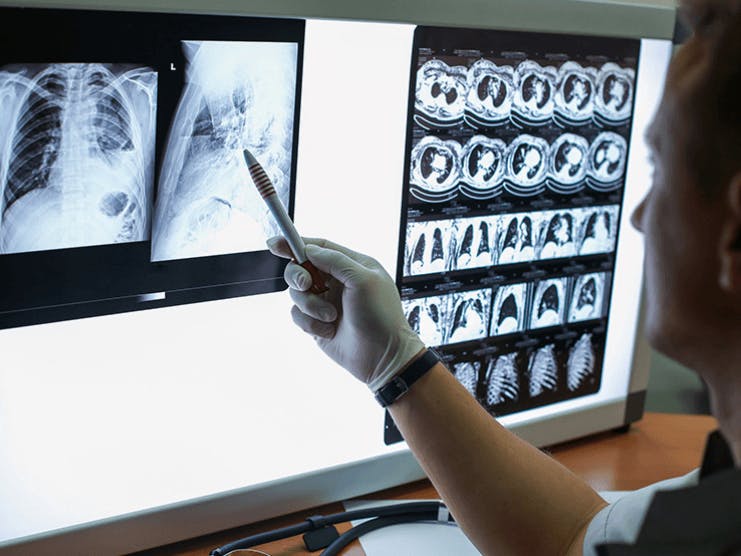
Early diagnosis is your best bet for beating lung cancer.
Smoking cigarettes is the number one risk factor for lung cancer, linked to about 80-90% of lung cancer deaths. People who smoke are 15-30x more likely to get lung cancer than those who do not, and even smoking a few cigarettes occasionally increases risk.
Quitting smoking is one of the best decisions you can make for your health – some studies show quitting before the age of 40 can reduce your chances of dying prematurely from smoking-related disease by 90%. Even smokers who quit after being diagnosed with cancer are better able to get better, reducing the chance of death by up to 40%.
If you currently smoke, or smoked in the past and quit, it's crucial to monitor your health closely to ensure you detect any health concerns early, when they are easier to treat. If you're eligible, lung cancer screenings, covered by Medicare, are a great option.
How often does Medicare cover a lung cancer screening?
Medicare Part B covers lung cancer screenings with low-dose computed tomography (LDCT) once per year if you meet certain eligibility criteria.
If your doctor accepts assignment, you pay $0 for this service.
A lung cancer screening detects the presence of lung cancer in otherwise healthy people, but who have a high risk of developing lung cancer. During the scan, the technician will lie you on a table and ask you to be very still. The table will slide through the center of a large CT machine that will take images of your lungs. You may be asked to hold your breath briefly, and images will be taken and reviewed by the doctor.
If no abnormalities are discovered, your doctor may recommend getting another scan the following year. If lung nodules, or small spots in the lungs, appear, they may just be monitored until your next screening. However, a large nodule may be cancerous, and you'll likely be referred to a lung specialist for additional tests, such as a biopsy.
Other heart and lung problems may also be detected. In this case, talk with your doctor to understand next steps.
Qualifications for lung cancer screening
To be eligible for Medicare coverage of your screening, you must meet the following conditions:
- Aged 55-77
- You don't have signs or symptoms of lung cancer
- You're either a current smoker, or have quit smoking within the last 15 years
- You have a tobacco smoking history of at least 30 "pack years" (an average of one pack – 20 cigarettes – per day for 30 years)
You must also get a written order from your doctor that confirms you meet the definition of high-risk.
Before your first lung cancer screening, you must schedule a lung cancer screening counseling and shared decision-making visit with your doctor. This is to discuss the benefits and risks of lung cancer screenings, and you can decide with your doctor if it's right for you. You'll also talk about the importance of quitting smoking, or staying quit, including Medicare-covered cessation counseling.
Why you should get a lung cancer screening
Unlike chest x-rays, LDCT scans can help find abnormal areas in the lungs that may be cancer, before symptoms develop and the cancer is too progressed. If lung cancer is found at an earlier stage, when it's small and hasn't yet spread, treatment is more likely to be successful.
Usually, symptoms of lung cancer don't appear until the disease is already at an advanced stage and can be confused for other problems associated with long-term smoking, so early detection is critical for treatment and even survival.
However, it's important to talk to your doctor about this screening because there are some risks:
- A lung cancer screening can suggest a person has lung cancer when no cancer is present
- A lung cancer screening can find cases of cancer that may have never caused a problem, leading to unnecessary treatment
- Radiation from repeated LDCT tests can cause cancer in otherwise healthy people
These risks are why most doctors recommend an LDCT test only if you're at high risk for developing lung cancer due to your smoking history and age.
Symptoms of lung cancer
Symptoms of lung cancer may include:
- Coughing that gets worse or doesn't go away
- Chest pain
- Shortness of breath
- Wheezing
- Coughing up blood
- Feeling very tired all the time
- Weight loss with no known cause
It's important to know that different people have different symptoms. Some have symptoms related to the lungs, while others have symptoms to other parts of the body where the cancer has spread. Other changes that sometimes occur in the lungs, such as developing COPD, may be symptoms of smoking but not lung cancer. If you're experiencing any symptoms, talk to your doctor right away.
Additional resources
What Are the Risk Factors for Lung Cancer?
External Website Link
Lung Cancer Screenings
External Website Link
5 Health Screenings to Ask Your Doctor About
Internal Website Link



